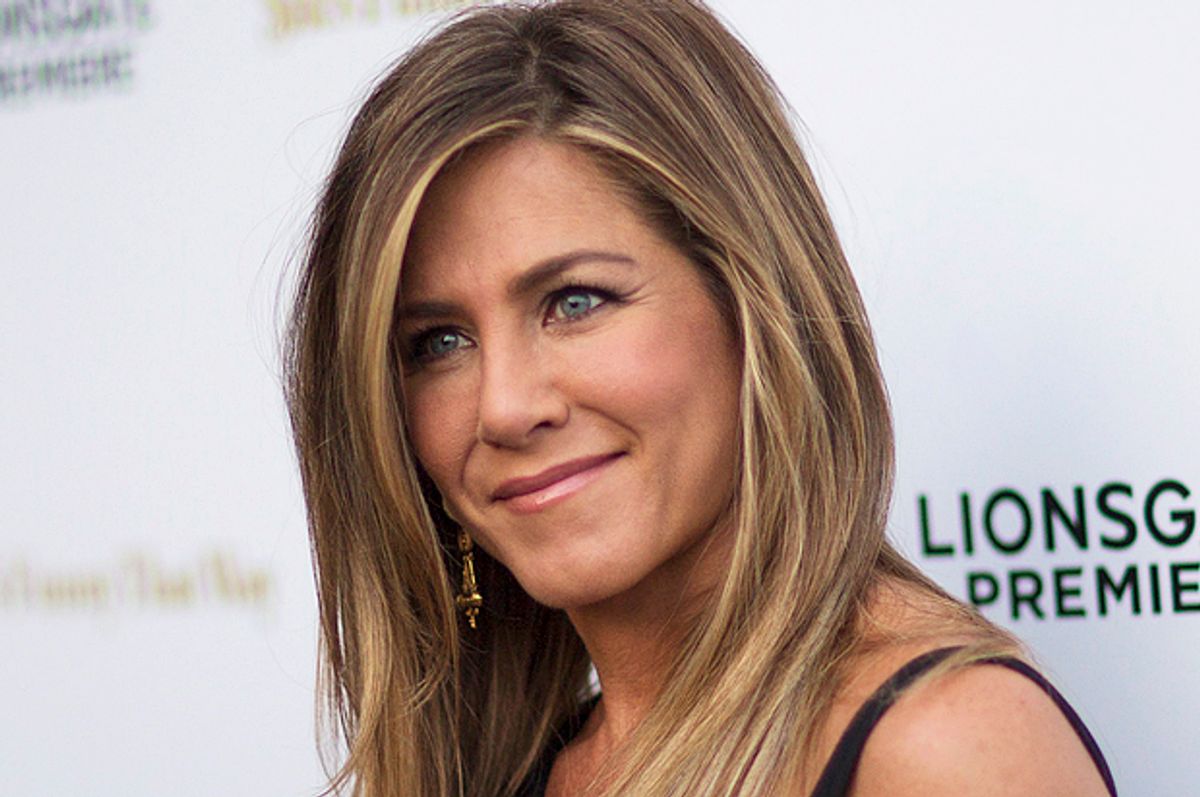One quirk of our time is the access we have to a plethora of information. A quick Google search can turn up facts and figures to almost any person, place or thing. In terms of people -- especially celebrities -- this access grants unprecedented insight into their lives, whether they want it or not.
Celebrities such as Taylor Swift have made careers off of perfectly-curated public images showcasing all the best boyfriends, #squadgoals, and barbecues anyone could possibly wish to pin or envy. For others, however, this system of ritual voyeurism is off-putting, despite how it may or may not bolster one's career.
Jennifer Aniston recently spoke out — a first for the Hollywood star who values her privacy the way most cling to thousands of Instagram followers — to express her distaste for the culture that values and encourages news cycles to center on the personal lives of celebrities. Her well-worded essay in Huffington Post had many thinking just one: Bravo.
For those who've been under a rock, Aniston has vehemently refused to engage in social media in order to protect her and her husband Justin Theroux's privacy. And yet the public continues to pry, often at the prodding of tabloids speculating about whether the actress has lost or gained a few pounds or if she's pregnant. Aniston is out to declare that this probing is not okay to do to anyone:
"If I am some kind of symbol to some people out there, then clearly I am an example of the lens through which we, as a society, view our mothers, daughters, sisters, wives, female friends and colleagues. The objectification and scrutiny we put women through is absurd and disturbing. The way I am portrayed by the media is simply a reflection of how we see and portray women in general, measured against some warped standard of beauty. Sometimes cultural standards just need a different perspective so we can see them for what they really are — a collective acceptance... a subconscious agreement. We are in charge of our agreement. Little girls everywhere are absorbing our agreement, passive or otherwise. And it begins early. The message that girls are not pretty unless they’re incredibly thin, that they’re not worthy of our attention unless they look like a supermodel or an actress on the cover of a magazine is something we’re all willingly buying into. This conditioning is something girls then carry into womanhood. We use celebrity 'news' to perpetuate this dehumanizing view of females, focused solely on one’s physical appearance, which tabloids turn into a sporting event of speculation. Is she pregnant? Is she eating too much? Has she let herself go? Is her marriage on the rocks because the camera detects some physical 'imperfection' ?"
Anniston is used to public interest in her personal life. Tabloid headlines questioned the state of her marriage and eventual divorce to Brad Pitt for years, and later continued with stories about the state of her body, her relationship, and her potential pregnancy status.
Simply put, it's none of anyone's damn business.
While many celebrities have gained footholds in the industry by oversharing details of their lives to millions of hash tagging strangers, there ought to be an opt-out clause that doesn't involve retreating into isolation — an artist should be able to promote her work without entering into a tacit agreement to either participate in gossip narratives or suffer the consequences. Why do we choose to devalue the work a person creates by probing so deeply into their personal lives that probably aren't any more exciting than our own, anyway?
Because it sells magazines and fantasy.
Our culture is obsessed with images that sell a certain aesthetic, luxuries that highlight we've made it. Images of ideals representing that we're good enough, whatever that means.
This is unfortunately often tied to a woman's body (how thin, curvy, fit she is), marital and parental status. In 2016 we have the ability to catch Pokémon at nearly any location in the world, and yet valuing a woman as anything other than an object or reproductive property still hasn't caught on.
Many people consume the gossip rags without realizing the implications that they reinforce: that things should be this way.
Anniston took a bold step in expressing her distaste for this tendency by encouraging change. Her aplomb throughout her career has helped solidify her status as a celebrity to admire for her class. I'm not sure anyone can count how many times she's taken the high road by ignoring cruel headlines and potentially dangerous photographers lurking outside her home, but I commend her for her grace and bravery to declare enough is enough.
Yes, Anniston is a beautiful and successful woman anyone would aspire to emulate or marry, but she's also a person. She's correct to point out the toxic fantasy that gossip journalism circulates to impressionable readers. Maybe someday we'll realize it's more important to fulfill our own lives rather that satisfy a culture that encourages unrealistic fairy tales. That would be a real happy ending.

Shares